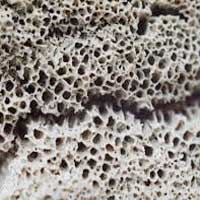 The way in which bone formation occurs needs to be redefined. It turns out that bone formation does not require complex biomolecules in collagen at all. This means that the production of bone substitutes and biomaterials is less complicated than was previously thought.
The way in which bone formation occurs needs to be redefined. It turns out that bone formation does not require complex biomolecules in collagen at all. This means that the production of bone substitutes and biomaterials is less complicated than was previously thought.
Oct 8th, 2020
Read more
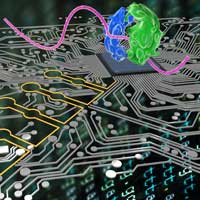 Computational algorithms enable identification and optimization of RNA-based tools for myriad applications.
Computational algorithms enable identification and optimization of RNA-based tools for myriad applications.
Oct 7th, 2020
Read more
 Researchers have created a way of using synthetic liquid crystals to squeeze red blood cells and gain new insight into individual cells? mechanical properties. The process also illuminates minuscule differences between cells within a large population as each cell reacts to the same strain or force, revealing just how diverse the cells are.
Researchers have created a way of using synthetic liquid crystals to squeeze red blood cells and gain new insight into individual cells? mechanical properties. The process also illuminates minuscule differences between cells within a large population as each cell reacts to the same strain or force, revealing just how diverse the cells are.
Oct 6th, 2020
Read more
 Bioengineers are devising a hot new technology to remotely control the positioning and timing of cell functions to build 3D artificial, living tissues.
Bioengineers are devising a hot new technology to remotely control the positioning and timing of cell functions to build 3D artificial, living tissues.
Oct 5th, 2020
Read more
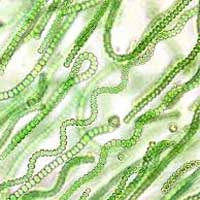 Researchers show how the catalytic activity of cyanobacteria, also known as blue-green algae, can be significantly increased. This brings biotechnological and thus eco-friendly application a big step closer.
Researchers show how the catalytic activity of cyanobacteria, also known as blue-green algae, can be significantly increased. This brings biotechnological and thus eco-friendly application a big step closer.
Oct 5th, 2020
Read more
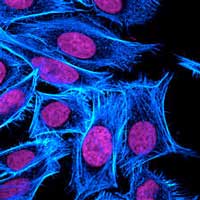 Scientists discover a natural food pigment that can distinguish between living and dead cells in cell cultures.
Scientists discover a natural food pigment that can distinguish between living and dead cells in cell cultures.
Sep 28th, 2020
Read more
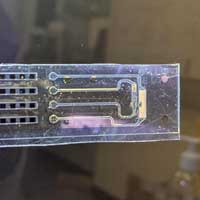 Driven by a machine learning algorithm, the closed-loop biohybrid device maintained a set membrane voltage in human stem cells for 10 hours.
Driven by a machine learning algorithm, the closed-loop biohybrid device maintained a set membrane voltage in human stem cells for 10 hours.
Sep 24th, 2020
Read more
 Scientists have engineered a key plant enzyme and introduced it in Escherichia coli bacteria in order to create an optimal experimental environment for studying how to speed up photosynthesis, a holy grail for improving crop yields.
Scientists have engineered a key plant enzyme and introduced it in Escherichia coli bacteria in order to create an optimal experimental environment for studying how to speed up photosynthesis, a holy grail for improving crop yields.
Sep 22nd, 2020
Read more
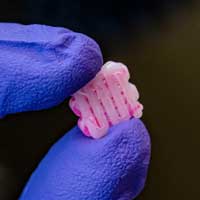 A dose of artificial intelligence can speed the development of 3D-printed bioscaffolds that help injuries heal.
A dose of artificial intelligence can speed the development of 3D-printed bioscaffolds that help injuries heal.
Sep 21st, 2020
Read more
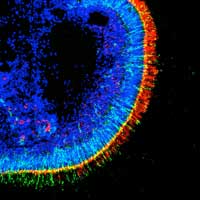 Scientists have generated accurate replications of human retinas in culture that can be used to pinpoint the specific types of cells affected by genetic eye diseases. The culmination of a six-year effort, this achievement will accelerate progress in developing new therapies.
Scientists have generated accurate replications of human retinas in culture that can be used to pinpoint the specific types of cells affected by genetic eye diseases. The culmination of a six-year effort, this achievement will accelerate progress in developing new therapies.
Sep 21st, 2020
Read more
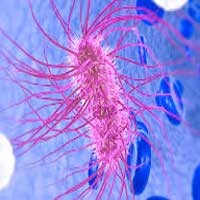 Scientists have commandeered simple, single-celled microorganisms - namely E. coli bacteria - and engineering them to explore the complex process of glycosylation and the functional role that protein-linked glycans play in health and disease.
Scientists have commandeered simple, single-celled microorganisms - namely E. coli bacteria - and engineering them to explore the complex process of glycosylation and the functional role that protein-linked glycans play in health and disease.
Sep 16th, 2020
Read more
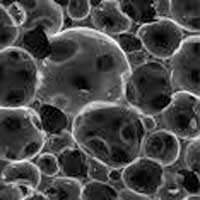 Biosensors that are wearable on human skin or safely used inside the body are increasingly prevalent for both medical applications and everyday health monitoring. Finding the right materials to bind the sensors together and adhere them to surfaces is also an important part of making this technology better.
Biosensors that are wearable on human skin or safely used inside the body are increasingly prevalent for both medical applications and everyday health monitoring. Finding the right materials to bind the sensors together and adhere them to surfaces is also an important part of making this technology better.
Sep 16th, 2020
Read more
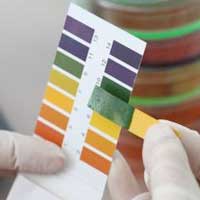 Scientists employ genetically engineered viruses to produce intuitive color-coded sensors for detecting airborne chemicals.
Scientists employ genetically engineered viruses to produce intuitive color-coded sensors for detecting airborne chemicals.
Sep 11th, 2020
Read more
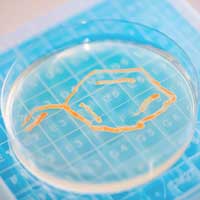 Microorganisms equipped with the genetic blueprints for certain enzymes act as sustainable chemical factories.
Microorganisms equipped with the genetic blueprints for certain enzymes act as sustainable chemical factories.
Sep 10th, 2020
Read more
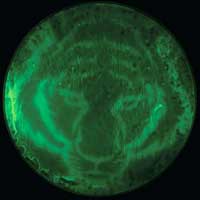 Working in E. coli, the workhorse organism for scientists to engineer metabolism, researchers developed a system for controlling one of the key genetic circuits needed to turn bacteria into chemical factories that produce valuable compounds such as the biofuel isobutanol.
Working in E. coli, the workhorse organism for scientists to engineer metabolism, researchers developed a system for controlling one of the key genetic circuits needed to turn bacteria into chemical factories that produce valuable compounds such as the biofuel isobutanol.
Sep 9th, 2020
Read more
 When coated with specific chemicals, these biodegradable aerogels that can be used to keep fruits and vegetables for a longer period, and to remove toxic metals from wastewater, among a wide range of other applications.
When coated with specific chemicals, these biodegradable aerogels that can be used to keep fruits and vegetables for a longer period, and to remove toxic metals from wastewater, among a wide range of other applications.
Sep 8th, 2020
Read more
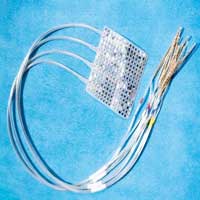 Stable recordings let brain and machine learning system build 'partnership' over time.
Stable recordings let brain and machine learning system build 'partnership' over time.
Sep 7th, 2020
Read more
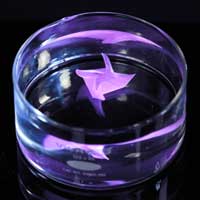 Researchers have developed a biocompatible material that can be 3D-printed into any shape and pre-programmed with reversible shape memory.
Researchers have developed a biocompatible material that can be 3D-printed into any shape and pre-programmed with reversible shape memory.
Sep 4th, 2020
Read more
 The way in which bone formation occurs needs to be redefined. It turns out that bone formation does not require complex biomolecules in collagen at all. This means that the production of bone substitutes and biomaterials is less complicated than was previously thought.
The way in which bone formation occurs needs to be redefined. It turns out that bone formation does not require complex biomolecules in collagen at all. This means that the production of bone substitutes and biomaterials is less complicated than was previously thought.
 Subscribe to our Biotechnology News feed
Subscribe to our Biotechnology News feed















